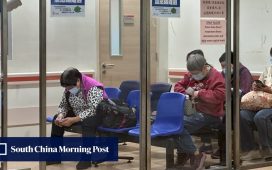Hong Kong’s Dental Association has said it is concerned an expansion of an elderly healthcare voucher scheme to more hospitals and dental clinics in the Greater Bay Area could deal a blow to business and the economy, despite assurances from authorities local dentists will remain competitive given the quality of service.
Dental Association president Spencer Chan Chiu-yee said on Tuesday the economic damage would be significant if all Hong Kong elderly residents in mainland China opted to use dental services across the border.
“The local economy has been recovering slowly,” Chan told a radio programme. “With 500,000 Hongkongers residing in Greater Bay Area cities and 90,000 of them eligible to use the Elderly Health Care Voucher … some HK$100 million [US$12.8 million], or up to HK$200 million, will be snatched from the local economic system.”

The government on Monday announced the plan to expand the usage of the elderly healthcare voucher scheme to seven additional hospitals and dental clinics in mainland cities from the third quarter at the earliest, allowing older residents to enjoy services at a cheaper price than in Hong Kong.
Chan also said the scheme’s expansion would encourage residents to visit dentists on the mainland, adding that some local private dental clinics suffered a 20 to 30 per cent drop in business after the city’s border with Shenzhen reopened last year.
The bay area refers to Beijing’s initiative to integrate Hong Kong, Macau and nine mainland China cities into an economic powerhouse by 2035.
Health officials said they hoped the scheme could benefit elderly city residents who were retiring in the bay area and those living in Hong Kong who wanted to use dentists across the border.
Elderly able to use Hong Kong healthcare vouchers at 7 more bay area centres
Elderly able to use Hong Kong healthcare vouchers at 7 more bay area centres
Some Hongkongers were seen queuing up overnight for public dental services in 2022, while the charges at private clinics were deemed unaffordable and low value for money by some residents.
A resident surnamed Wong who called the radio programme cited her mother’s case as an example, saying it cost more than HK$700 for a dental X-ray and doctor fees without an actual check-up in a Hong Kong clinic.
But on the mainland she paid less than HK$200 for an X-ray, dental check and scaling services, calling the quality of service “much better”.
Dentist Chan explained that the public sector was facing a labour crunch due to the waves of retirement and migration, but said there were still enough private dentists in Hong Kong to cater to the needs of residents.
He added that operation costs in Hong Kong were high and it was hard to tell whether private clinics would lower their charges as they would face more competition from the mainland.
“The regulation in Hong Kong is quite stringent,” Chan said. “We can only operate when our tools and equipment comply with the rules. The overall cost is high. When it comes to lowering the charges, it depends on individual clinic’s operation directions.”
Asked whether the scheme’s expansion was to alleviate the labour shortage issue in public dental clinics, Deputy Secretary for Health Eddie Lee Lik-kong said the government’s intention was to offer alternatives to the city’s elderly.
Patient groups call for clarity on using Hong Kong healthcare vouchers on mainland
Patient groups call for clarity on using Hong Kong healthcare vouchers on mainland
Lee added that local dentists would still remain competitive given their high-quality services, while some residents would opt to visit their regular doctors.
“Those Hong Kong dentists operating near the border may face more pressure,” he said on the same radio programme. “I believe they are still competitive. As they notice changes in the market, they may have changes in their operation, maybe raising their service quality and renewing their charges.”
Professor Leung Wai-keung, president of the College of Dental Surgeons of Hong Kong, said he believed the impact on local dentists would be minimal.
“I don’t think at this present moment their choices may change,” he said. “[Patients’] considerations also [include] the quality of service, hygiene and sometimes they may consider prices. This is a difficult topic because patients may have different backgrounds, and their affordability of dental services may be different. It has to be considered on a patient-by-patient basis.”
One of the two dental centres included in the scheme, the Shenzhen C.K.J Stomatological Hospital near the Lo Wu border checkpoint, said more Hong Kong people inquired about their services after the government announcement.
Big gaps in dental care mean choosing to either pay up or wait it out
Big gaps in dental care mean choosing to either pay up or wait it out
Chapman Chan Wing-kei, chief strategy and investment officer of the C-MER Eye Care Holdings operating the hospital said half of its customers, or 10,000, came from Hong Kong every month.
He said it would be difficult to assess whether more elderly residents from the city would opt for their services when they could use healthcare vouchers in the hospital in the future.
“Without the voucher, we have quite a number of Hong Kong customers. The voucher is just offering another payment,” Chan said on the radio show.
He added the expansion of the scheme could offer another option for patients as some would feel comfortable visiting mainland dentists for a lower price.
Additional reporting by Sammy Heung







